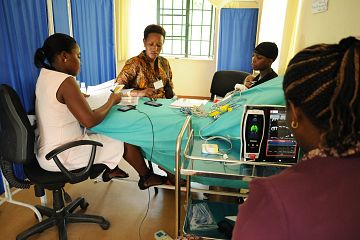Sub-Saharan countries well positioned to pioneer digital molecular diagnostics for infectious diseases as part of an African digital transformation
1 July 2022
In a new paper published in PLOS Digital Health, researchers highlight how early adoption of digital molecular diagnostics – small electronic tools that analyse samples and give a diagnosis for infectious diseases – could accelerate healthcare provision in sub-Saharan countries.
The team of authors, which included researchers from Imperial College and Malaria Consortium, outline the need for dramatic changes in access to diagnostics and treatment, along with better acquisition and use of data to efficiently target and monitor interventions and ultimately enable those countries to deliver universal healthcare, ensure healthy lives and promote well-being for all.
Sub-Saharan Africa (SSA) experiences the greatest gap between health needs and healthcare provision in the world. At least 50 percent of the population do not have access to essential health services. Infectious diseases are a dominant cause of premature death, chronic illness, loss of productivity and a major impediment to economic growth, education and human development on the sub-continent.
To ensure optimal management of patients with infectious diseases, molecular diagnostics need to be used as point of care tests to be of maximum benefit. Such diagnostics also provide vital epidemiological information that underpins local and national disease prevention and control strategies.
But rather than trying to recapitulate the diagnostic laboratory models that have developed in high-resource settings, African countries have the potential to pioneer new models of healthcare designed around digital diagnostics that are easier to implement and scale up to save lives.
“Digital molecular diagnostic describes a small electronic device that provides a sample-to-answer solution to a diagnostic problem, in a portable, easy-to-use, robust and cheap format. To reduce the gap between diagnostics needs and diagnostics provision, the Digital Diagnostics for Africa Network is working on developing such cheap lab-on-a-chip technology at the point of care in sub-Saharan Africa. Our vision for its transformative potential goes well beyond the ‘diagnostics gap’”, said Dr Aubrey J. Cunnington, Director of the Digital Diagnostics for Africa Network, Imperial College London.
"This digital device is a promising game-changer for diagnostics and case management across different settings in Africa. We are excited to be part of this team in developing this further", said Dr Jane Achan, Principal Advisor, Malaria Consortium.
As part of digital diagnostics, any processing of a biological sample would ideally be integrated into the digital diagnostics device, before allowing quantitative detection of the molecules used to make the diagnosis. Signals from the detection of molecules undergo processing within the device, so that actionable results are reported to the user without the need for further analysis. Results may be displayed on the device itself, or linked to other interfaces such as smartphones, and decision support may be integrated. Quantitative data generated by the device can be easily and immediately transmitted to facilitate patient care and contribute to disease surveillance.
Digital transformation
The World Bank and African Union predict a digital transformation that will accelerate trajectories of economic growth and innovation in Africa over the next decade. There is an opportunity for a parallel digital revolution in diagnostics. In a similar way to mobile phone technology leap-frogging conventional landline infrastructure in most of SSA, a digital diagnostic ecosystem has the potential to replace many of the needs for conventional diagnostic laboratory infrastructure that can be complex and costly.
Despite clear potential for widespread benefits from digital molecular diagnostics, successful implementation presents major challenges which must be addressed. These include readiness and willingness to change across many sectors, generating stakeholder and funder support to catalyse this change, and negotiating the practical challenges of physical, digital and regulatory infrastructure.
Understanding the perspectives of patients and healthcare workers is important, but consideration must also be given to the broader health system, government organisations, the commercial sector, international funders and policy makers. This may start with mapping who the stakeholders are, identifying their needs, discussing their expectations for a new diagnostic, and engaging them throughout product design, development and evaluation in a co-design process.
Crossing from development to implementation requires that digital molecular diagnostics are scalable, economically viable, have the evidence base required to achieve regulatory approval, and have endorsement at national, and often international, levels in the form of guidelines and policies.
While the focus is on using molecular diagnostics for infectious diseases in SSA, similar principles apply to digital diagnostics for non-communicable diseases, and other resource-limited settings, the authors stress.
Related content
20 May 2022
Annual SMERG meeting drives digitalisation of malaria surveillance
23 April 2021Smart diagnostics: The stepping stone in the pathway to malaria elimination
Latest news
- International summit calls for AMR accountability in public health interventions21st March 2024
- Global SMC community celebrates new milestone at SMC Alliance Annual Meeting in Nigeria6th March 2024
- Scaling up key interventions could halve pneumonia-related childhood mortality13th February 2024
- Malaria Consortium and eGov Foundation join Mozambique’s national malaria programme to digitalise seasonal malaria chemoprevention campaigns8th February 2024
- World’s first malaria vaccine rollout launched in Cameroon22nd January 2024
- Digital solutions driving equitable access to health6th December 2023